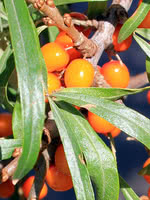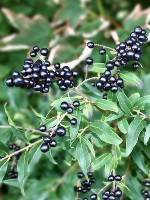Mon-Fri 9am - 5pm Mountain time
Sea Buckthorn (Seaberry) vs Wild Privet
Hippophae rhamnoides l.
Ligustrum vulgare
NOT AVAILABLE THIS SEASON - MIGHT RETURN
Sea Buckthorn, aka Seaberry, is a nitrogen fixing shrub that produces attractive berries high in vitamin C.
While we can't confirm claims that the berries are effective in treating various ailments, many people believe consuming the berries helps with arthritis, infections, and asthma, among other things.
Sea Buckthorn plants have attractive pale silvery-green leaves, dense branches, and large thorns, people like to grow in ornamental hedges or as a first row in a shelterbelt.
Note: Sea Buckthorn is dioecious, meaning male and female flowers grow on separate plants. Both are required for fruit production, though only female plants bear fruit. A plant’s sex typically cannot be identified until its third or fourth year. Our seedlings are too young to determine their sex.
Wild Privet is a fast growing ornamental shrub that is well suited for forming hedges and privacy screens. It will retain its leaves in warmer climates but drops them in colder areas. They have small white flowers, though the smell is often considered unpleasant. While the berries are inedible, they are a good food source for many bird species.
It is recommended to prune Wild Privet immediately after flowering, as it can readily self seed. It is deer and rabbit tolerant. It can grow in dry areas, on slopes, and withstand the wind making it well suited for many growing conditions.
Sea Buckthorn (Seaberry) Quick Facts
Wild Privet Quick Facts
Toxicity: If ingested, all parts of this plant will cause severe discomfort. Toxic to dogs, cats, and horses
In row spacing: 0.9 - 1.2 m (3 - 4 ft)

